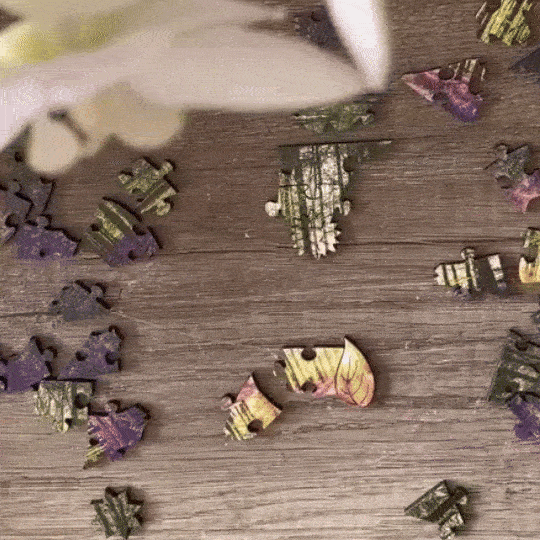



This year, Mental Health Awareness Week and Dementia Action Week take place during the same week, from Monday 13th May – Sunday 19th May. We are showing our support for these campaigns by donating 10% of sales from our Mini Mindful and our Large Piece Puzzles to leading mental health charities; the Mental Health Foundation and the Alzheimer’s Society.
Our Mini Mindful jigsaw puzzles provide a brief but beneficial break from daily stresses. The collection includes puzzles with whimsies and others with extra difficult details such as repetitive pieces and specially selected images to challenge puzzlers. These little puzzles will reset your mind, and give your brain a boost. They may be mini but they will provide maximum screen-free fun.
Our collection of large piece puzzles are perfect for people who have visual or fine motor impairments. The selection of large piece jigsaw puzzles for adults is suited to people who prefer larger, more manageable pieces. These jigsaw puzzles with larger pieces have been added to our collection of 50-250 large piece puzzles. In this collection, you will also find 100 large piece puzzles and 50 piece puzzles with extra large puzzle pieces, which are also fantastic for little puzzlers who may need large pieces to help keep them puzzling for longer.
We are proud to be donating to the Mental Health Foundation and the Alzheimer’s Society this year and thank you in advance for your support.


The Mental Health Foundation started an annual UK Mental Health Awareness Week 23 years ago. Each year they focus on a particular theme, with the aim of improving outcomes in mental health.
This year the theme is, ‘Movement: moving more for our mental health’. The Mental Health Foundation explains that “Movement is important for our mental health. But so many of us struggle to move enough. We know there are many different reasons for this, so this Mental Health Awareness Week we want to help people to find moments for movement in their daily routines. Going for a walk in your neighbourhood, putting on your favourite music and dancing around the living room, chair exercises when you’re watching television – it all counts!”




FIND YOUR MOMENTS FOR MOVEMENT
Finding time to move can be a barrier but the Mental Health Foundation has provided some useful tips to help us prioritise movement and make incorporating it into our lives easier. Our bodies and minds are connected and looking after our bodies and minds is equally as important. Looking after our physical selves can help support better mental well-being.
Find moments for movement everyday
Set small, achievable goals
Take a break from sitting
Find the fun in movement
Use the opportunity to connect with others
Find you favourite method of moving
Be mindful about your movement
Move in nature
Try something new
Plan things to look forward to that involve movement
Listen to some motivational music that gets you moving
Be kind to yourself, moving more is self-care
Don’t forget to rest
Celebrate your achievements


In the UK, one person develops dementia every three minutes and it is estimated that 70% of people in care homes have dementia or have severe memory problems. There are over 42,000 people under 65 with dementia in the UK. This is known as young-onset dementia.
The Alzheimer’s Society is a powerful force for change supporting everyone affected by dementia. Dementia Action Week is a campaign run by the Alzheimer’s Society to raise awareness and encourage people to ‘act on dementia’.
In 2022, Dementia Action Week encouraged people who were concerned that they or someone they know may be experiencing dementia symptoms to seek help and throughout the week, they saw a 43% increase in calls to their dementia support line from those seeking information and support. This year the emphasis is still just as important and the Alzheimer’s Society note that a dementia diagnosis is vital to give people access to the care, treatment and support they desperately need.
One of the main symptoms of dementia is memory loss and jigsaw puzzles for adults can provide valuable stimulation, that helps to improve brain functions, including short-term memory.


HOW JIGSAW PUZZLES CAN HELP YOUR MENTAL HEALTH
Jigsaw Puzzles have many benefits for mental well-being. As well as being a relaxing distraction from screens, studies such as the MacArthur study have found that the mental workout from puzzles can lead to an improved quality of life.
Simon Alexander Ong (Mindfulness expert and author of Energize: Make the Most of Every Moment) says:
“The activity of completing jigsaws is a great example of mindfulness in action with benefits similar to that experienced through meditation. Your energy is brought into the present moment and immersed in a single activity. As a result, your mind quietens, your concentration heightens and your experience of being in a flow state is initiated.”
Our Mini Mindful puzzle collection, are purposefully designed, with the benefits of mindfulness at the forefront. They are an ideal way to help calm your mind – piece by piece – they take around 20-30 minutes to complete, simple to add into your day whenever you need to take a little time out.
Our large piece puzzles are perfect for those who want to enjoy all the fun of regular puzzles but who perhaps struggle with the traditional smaller pieces. These puzzles still offer all the fun and challenges of our other puzzles, with irregularly shaped pieces and themed whimsies.
RESOURCES
If you wish to find out more about the Mental Health Awareness Foundation, and the work they do, please visit: https://www.mentalhealth.org.uk
For more on the Mental Health Awareness Week’s theme of movement:
https://www.mentalhealth.org.uk/our-work/public-engagement/mental-health-awareness-week
To find out more information and advice on dementia please visit: https://www.alzheimers.org.uk/about-us/who-we-are
For more information on Dementia Action Week please visit: https://www.alzheimers.org.uk/get-involved/dementia-action-week





